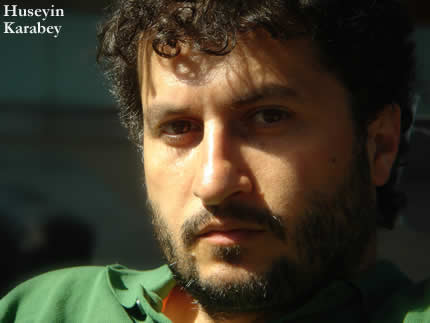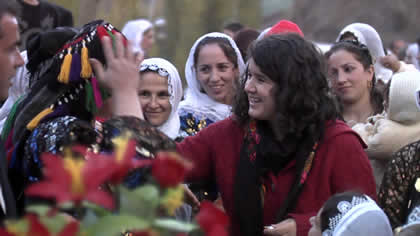 My Marlon and Brando is the true-life, border-crossing romance between a Turkish actress and her Kurdish lover. In this semi-fictional work-up, the real actress earns kudos for taking on her own role in a moving statement on war, human rights and the confining artificiality of borders.
My Marlon and Brando is the true-life, border-crossing romance between a Turkish actress and her Kurdish lover. In this semi-fictional work-up, the real actress earns kudos for taking on her own role in a moving statement on war, human rights and the confining artificiality of borders.
Huseyin Karabey, director of My Marlon and Brando, is regarded as one of Turkey’s new directing talents at a time when the independent film scene in Turkey is gaining recognition and Turkish films are receiving a wider distribution worldwide. Despite the challenging subject matter of many of his previous documentaries and short films, Karabey’s work has been shown through a number of alternative channels. GITMEK (My Marlon and Brando) is his first feature film; it was selected for Rotterdam’s Cinemart 2006 and No Borders/IFP.
Karabey entered the Cinema-TV department of the Fine Art Faculty of Marmara University and graduated in 2001. He went onto develop BORAN, a short film that explores the disappearances of 5,000 political activists in Turkey during the 90’s by merging factual reporting and a dramatic treatment. This highly cinematic piece of work has been shown at festivals worldwide as has SILENT DEATH, a feature length docu-drama.
Bijan Tehrani: How did you come up with the story for “My Marlon and Brando”?
Huseyin Karabey: A few years ago I was working with the screenwriter, Ayca Damgaci. We met, and she wanted to learn, but wasn’t sure what she wanted to do. After a while she went to Iraq  and came back, and decided to make her story a feature film. I asked her to play the role of Ayca, and she was really scared, but then was convinced. And so we wrote the script together.
and came back, and decided to make her story a feature film. I asked her to play the role of Ayca, and she was really scared, but then was convinced. And so we wrote the script together.
BT: So, this is based on a true story?
HK: Yes. It is structured on a real story. We recorded the real events most of the time, like the Kurdish wedding, and some characters as well. Some of the movie is based on a true story, another part is based on my own experience, and the third part is already recorded. We decided to use all of the elements of cinema.
BT: How did you work with your actors? Were they all professionals?
HK: I wanted to really focus on directing the acting. In my films I work with ordinary people and professional actors on the same level. Some characters are professional actors, and others are ordinary people. For example, the first refugee painter is an actor. He did a great job. The Iranian driver is a real driver. When Ayca wrote her memories about Iran, she mentioned that there was a driver who took her around. We met a guy during pre-production in Iran who was changing money, and during that time I decided to ask him to play in my movie. He accepted, and after two months, we went to shoot with Ayca. Ayca said to me, ‘This was my driver!’ It was the same guy! It was so surprising. It was a big coincidence, but it was also our ability to risk reality that caused it. Another Kurdish mother at the border was a real person.
BT: The bridge between reality and fantasy was very interesting in this film. For example, the parts with Hama Ali in Iraq were marvelous. How did you decide to do that?
HK: There were two main reasons to create that character. For one, I had to create a reason to convince the audience, and also I didn’t want to create a cliché. On the other hand, he is Kurdish, and that culture is based on an oral tradition. I decided to use the video love letters. The idea comes from that. With the video love letters, I could also use the real material, which is very strong. It was nice, and a good idea.
BT: How difficult was making this film?
HK: It was difficult to finance. Most of the films never get financed. This time, it required a lot of money, so I tried very hard to obtain international funds and grants. It took two and a half years to find the funds, but I couldn’t finish under budget, so I had to decide whether to shoot or wait, and I decided to shoot. I was lucky—during the shooting we didn’t have any problems. This was because of my experience and my crew’s experience, and also because we were  lucky. All of the three countries we shot in do not have normal regimes, but we didn’t have any huge problems.
lucky. All of the three countries we shot in do not have normal regimes, but we didn’t have any huge problems.
BT: How was shooting in Iran?
HK: Part of our crew was Iranian, and we met very nice people there. We decided to only bring six or seven people from Turkey, and the rest were Iranian. Luckily, we got the permission we needed, and we shot. A few times they took our cameras, and said our papers were not enough, but somehow, we managed to finish the film.
BT: How has the film been received in Turkey and other nations?
HK: In Turkey it has actually been very good. We won three prizes in International competition. I am happy with it, and especially with the discussion it has created among film critics and the media. Everyone has good things to say about it. I truly believe that the society is ready and hungry for this kind of film. Also, outside of Turkey it has been successful, more successful than I thought, because I was stressed. We have won nine awards internationally, including Best Narrative Filmmaker in Tribeca.
BT: What are you plans for the future?
HK: I am Kurdish myself, and I decided to make a film to share my own experience, related to the Kurdish and Turkish relationship. The earliest I will start it is March, 2010, and I am writing the project now.

